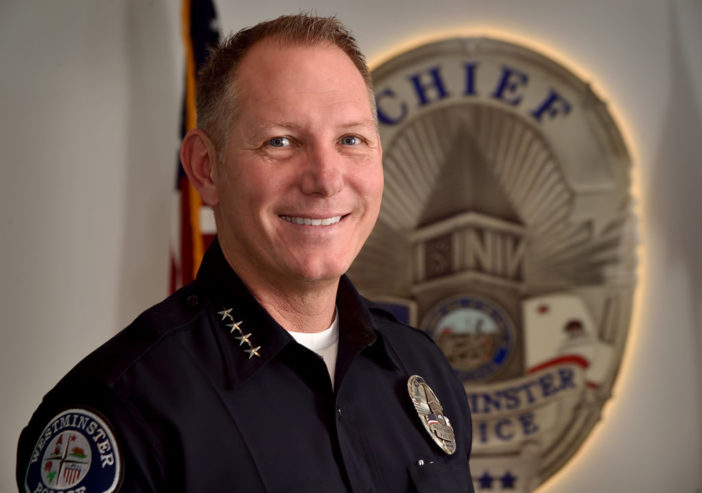Westminster’s new police chief is a black-and-white kind of guy.
In late 1993, when Mark Lauderback was putting himself through the police academy at Golden West College, two agencies took an interest in him.
The Westminster PD started processing him and was conducting a background investigation when a hiring freeze hit.
We’ll hire you as a reserve, the WPD told Lauderback.
But he wanted a full-time job. Luckily for him, the Chino PD also picked him up.
“So as Chino was doing a background check,” Lauderback recalls, “Westminster calls up and says, ‘Hey, guess what? We’ve got permission to hire you so we’re going to finish your background.’”
Lauderback decided to go with whatever agency finished first.
Both, however, finished the same day.
Lauderback ended up choosing the WPD, but not because he grew up in the city.
“The biggest selling point was Chino had white police cars, and Westminster had black-and- white police cars,” says Lauderback. “Police cars are black and white, fire engines are red, and I wasn’t going to work for a city that had white police cars.
“It wasn’t about pay. It wasn’t about the benefits. It wasn’t about commuting or crime or opportunity. It was about the color of the police cars.”
It’s no surprise, then, that one of the first things Lauderback did when he officially became chief of the WPD on Oct. 21, 2019, was decide to switch all the agency’s cars back to black and white.
About 15 years ago, the WPD went to all-black vehicles.
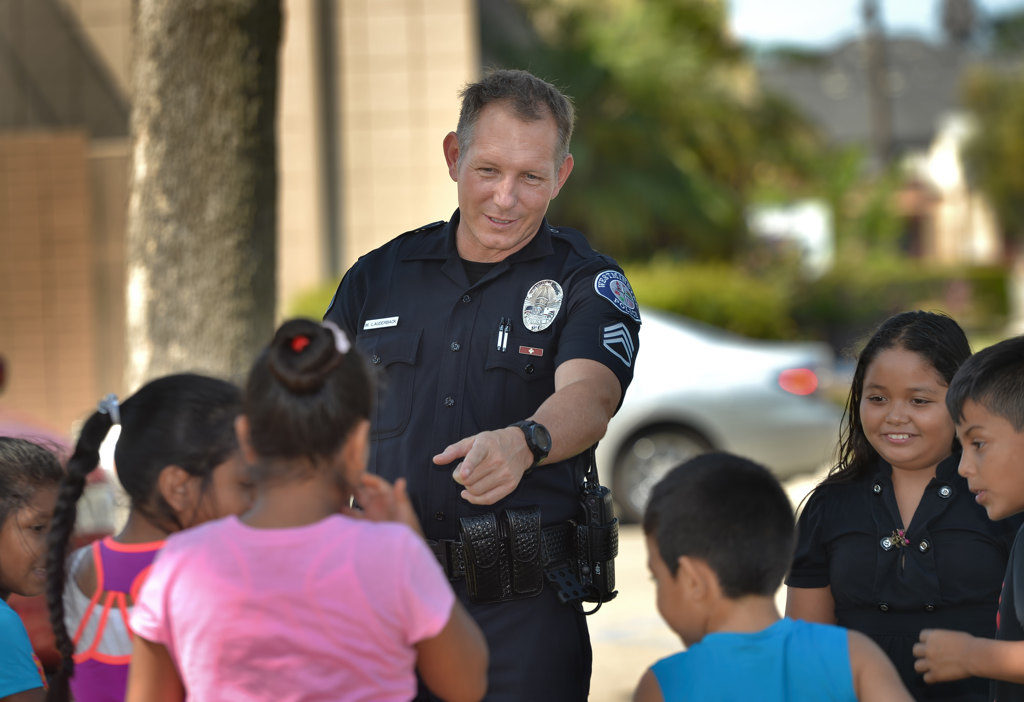
In this file photo, then-Sgt. Mark Lauderback of the Westminster PD talks to kids at Sigler Park in Westminster.
Photo by Steven Georges/Behind the Badge OC
“You’d be surprised how many (police officers) are excited that we’re going back to black- and-white (vehicles),” says Lauderback, who was named acting chief of police on Jan. 30, 2019, following the departure of Chief Ralph Ornelas.
Lauderback, who has spent his entire 25 years as a cop at the WPD, was appointed interim chief of police on June 15, 2019.
Now that he’s chief, Lauderback is focusing on the relatively small things – like getting cars repainted – in an effort to build up agency morale following several rocky years of lawsuits and other challenges.
“For me, this is a fresh start,” says Lauderback, 50. “I want to focus on the department and focus on the people, because they’re our greatest asset. If people are happy in the workplace, they’re going to do a good job. And that’ll spill out into the community.
“I think we do a great job with the community – we’ve taken care of the community for a long time – but right now, we need to take care of each other and we need to make this a fun place for people to get excited to come to work.
“Because if you’re excited to be here, you’re going to be excited to go out there and work. You’re going to produce a great product. We do produce a great product, but now we need to produce a great product inside (the agency) as well.”
REMINDERS
Lauderback’s office, located on the third floor of the WPD, is clean and uncluttered.
Among the few items on display are a handful of pictures of him with close colleagues, including a motor sergeant (Lauderback was a motor officer for 10 years).
“There are so many stressors related to this job that I just want to be surrounded by my friends and make things a little more upbeat,” he says.
Another picture shows Lauderback and other WPD officers handing a check to a father whose daughter was killed by a motorist evading police. The WPD raised more than $40,000 for the family of Vivian Nguyen, 12, who was killed in April 2014 during a high-speed police pursuit.
Also on display are some awards Lauderback has won, including a Medal of Merit in 2015 for helping arrest the so-called Cal Bear Bandit. The criminal ended up being sentenced to 12 years in prison after he pleaded guilty to eight bank robberies in Orange County.
Lauderback also won a lifesaving award in 2011 when, on a SWAT callout, he helped revive a woman high on meth who was waving around a knife. She collapsed after being incapacitated with a Taser.
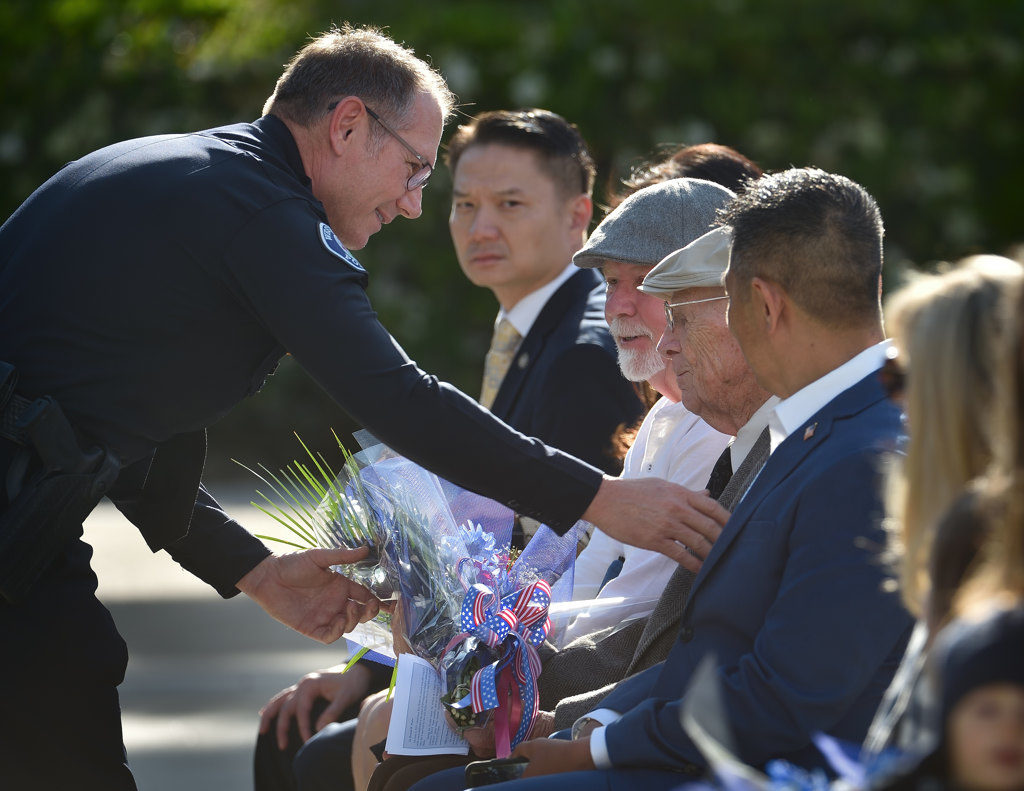
In this file photo, Westminster PD’s then-Acting Chief Mark Lauderback gives flowers to family members of WPD fallen officers during the agency’s annual memorial ceremony in May.
Photo by Steven Georges/Behind the Badge
NOT PLANNED OUT
For visitors to his office, Lauderback keeps a jar of caramels on his spick-and-span desk.
“I used to have Sugar Babies in there,” he says, “but everyone was going, ‘What are those?’”
Lauderback says he never planned on rising to the rank of chief.
“Not in a million years,” he says, adding: “I actually got into this job because I’ve always wanted to help people. I like working outside. I like the ever-changing environment. I never wanted to be inside every day.”
He looks around his very indoor office.
“Look at me now!” he says with a laugh.
STRUCTURE
Lauderback’s upbringing played a role in his interest in law enforcement.
He was raised, essentially, an only child by his grandparents when, at age 6 months, his parents split up. His father joined the Marines and went off to Vietnam and his mother fell into a lifestyle with bikers.
Lauderback’s grandfather spent 20 years in the Navy and ran a tight ship at home, which included step-siblings.
“With my grandfather,” he says, “things were very regimented. The house was always clean, and you didn’t leave dirty dishes in the sink. There was structure. I think that structure in my life carried over to a career that has structure and rules and that is very regimented.”
Before he became a police officer, Lauderback worked for the Park, Tree and Landscape Department for the City of Huntington Beach. He picked up trash and maintained all the center medians throughout the city.
“But I wanted something more,” he says.
At the time, Lauderback was living with a friend who had just become a police officer in Cypress.
Lauderback went on a ridealong, and was hooked.
“Seriously,” Lauderback told his roommate during the uneventful ridealong, “you get paid how much to do this job?”
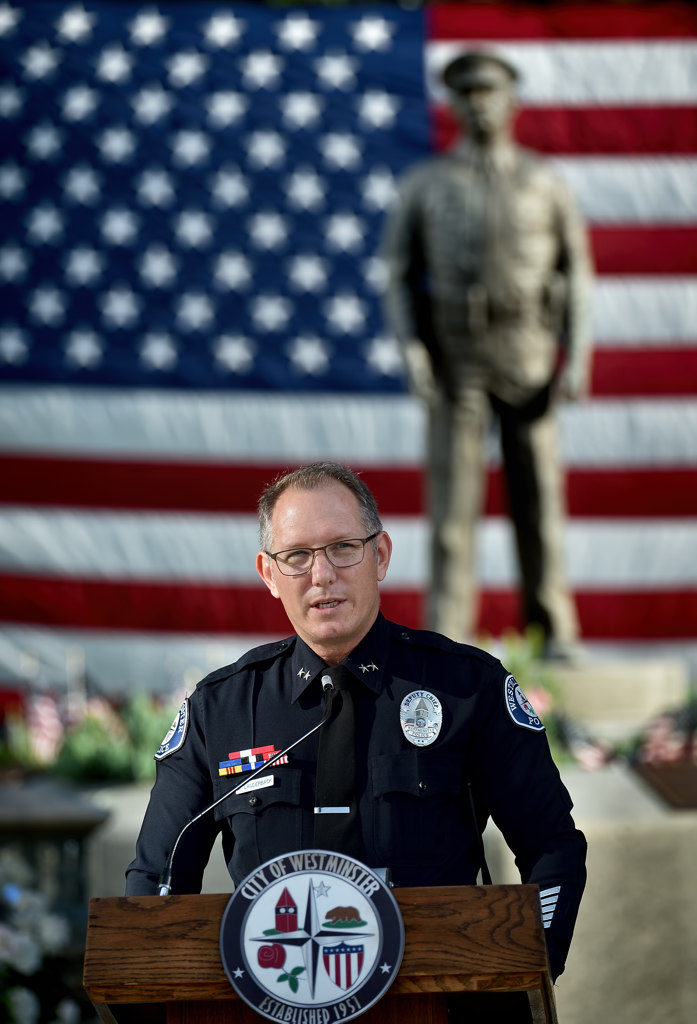
In this file photo, WPD’s then-Acting Chief Mark Lauderback gives the memorial address during Westminster PD’s annual memorial ceremony for fallen officers.
Photo by Steven Georges/Behind the Badge
PROMOTIONS
Lauderback worked as a rank-and-file police officer for 17 years at the WPD before his first promotion, to corporal, in 2011.
As a police officer, in addition to working motors, he served as a detective (auto theft, domestic violence, child abuse, school crimes, fraud), as an FTO (field training officer), and as the assistant team leader of SWAT.
“I wanted to do a lot with my career before promoting, because as you promote the opportunities to do other stuff diminishes quite a bit,” Lauderback says. “I enjoyed being a cop and I enjoyed working and there was a little light bulb that went off that said, ‘It’s time to promote.’”
Lauderback promoted to sergeant in 2015 and became a commander in 2017. He likened his stints, in January and June 2019, respectively, as acting chief and interim chief, to playing backup quarterback – always being prepared to run the agency, but not the guy officially running it.
Until now.
“I’ve never been somebody that always does stuff that’s just for me,” Lauderback says. “I always have done what’s best for the organization. So to do what’s best for the organization, you need to have input from the people that work for you. And that’s one thing that I think we offer here: We value our employees. We value our employees’ input. We value their ideas.
“And I’m the kind of guy who understands that people are going to make mistakes. I don’t want to say I embrace failure. But without failure, you can’t learn. If the Wright Brothers gave up after their first failure, where would we be today?”
INNOVATION
Lauderback has two grown kids and a grandchild.
His daughter, 25, is a receptionist for a construction company. His son, 23, is in college studying mechanical engineering.
During a Nov. 5 interview, Lauderback recently had returned from a four-day International Association of Chiefs of Police (IACP) conference in Chicago.
“Going there, we always think Westminster is a small town of 92,000 people,” Lauderback says. “But to go to an international conference and network with other agencies from across the nation and to find out that we are pretty far advanced as far as law enforcement agencies go, that was gratifying.”
The WPD was one of the first agencies in Orange County to go to body-worn cameras, as well as one of the first PDs in the county to go virtually paperless.
“Everything is pretty much generated via computer,” Lauderback says. “All our crime and accidents reports and photographs are all digital now. Our parking ticket writers use an iPhone-size ticket writer. The only time paper is generated is when a victim comes in to pick up a crime report.
“We’ve always just taken a unique approach to technology.”
Lauderback was a commander when he established the WPD’s first official Homeless Liaison Officer position, in 2018, as well as a contract and partnership with CityNet, a homeless outreach group. He was acting chief when he created and implemented the department’s School Resource Office position for all city schools.
He now oversees the WPD’s aggressive recruitment of new officers. The agency currently has 84 sworn officers but is budgeted for 92. Around 15 years, the WPD had a high of 105 police officers.
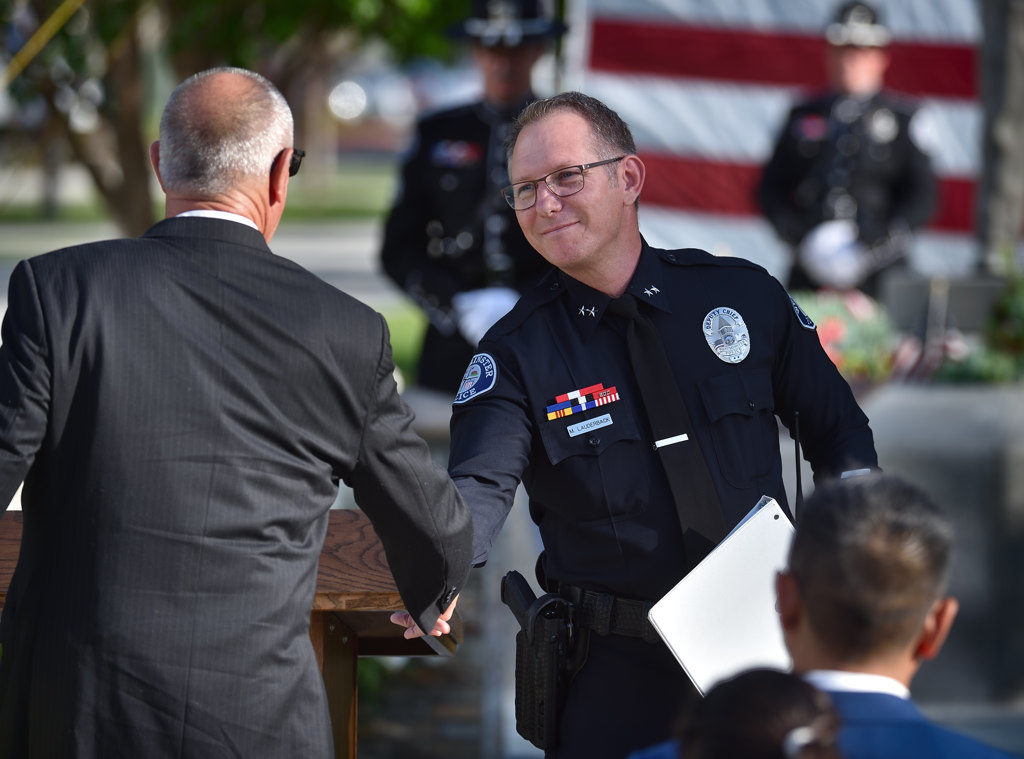
In this file photo, WPD then-Acting Chief Mark Lauderback thanks keynote speaker Pat Upstill as he comes up to take the stage during Westminster PD’s annual memorial ceremony for fallen officers.
Photo by Steven Georges/Behind the Badge
PROJECT W
Measure SS, a 1-percent tax increase Westminster voters approved in 2016, has added more money to the city’s general fund. Project W is a recently launched initiative that highlights to the community how the money is being used. You can find out more about Project W and its goals and vision here.
“Ever since the tax initiative passed, funding has stabilized, which has helped a lot with recruitment, because obviously nobody wants to go to a place that’s on the verge of going out of business, so that’s helped quite a bit,” Lauderback says.
Project W is a “great tool” that has helped the WPD’s homeless outreach, he adds.
“It’s afforded us the opportunity to get a designated homeless vehicle, a pickup truck, for our homeless liaison officer,” Lauderback says.
The WPD has implemented a $10,000 signing bonus for police officers who transfer from other agencies.
“We don’t have a finder’s fee, which would be pretty cool,” Lauderback says.
The new black-and-white police cars, set to be completed by the end of January, aren’t just an aesthetic improvement, Lauderback says.
“To me, it’s tradition,” he says. “But it’s also what people think about when they think of a police car. If you see two black cars or two white cars down the street, you’re not going to know (they are police cars, initially). So who are you going to run to if you’re in trouble? Who are you going to look to for help? You’re going to look for a black and white.
“My job as the chief is crime prevention. It’s also apprehension (of criminals), but it’s crime prevention. Do you want me to prevent the crime from happening to you or not? When (potential criminals) see a black and white, they think twice.”
Asked why he was interested in becoming the WPD’s permanent chief of police, Lauderback says: “I felt a sense of responsibility to the organization because I was born and raised in and grew up through this department. I didn’t want to let somebody else come in and take over our family.
“And I think there’s a reason things happen, and I’m at this place right now for a reason. And talking to my colleagues here in the organization and outside the organization and other chiefs, there’s a reason why I’m here and this is my department — I don’t want to give it up to somebody from the outside that doesn’t know our culture, that doesn’t know what we’ve been through – through suicides, through lawsuits, through layoffs, through this building and the issues that have popped up with it.”
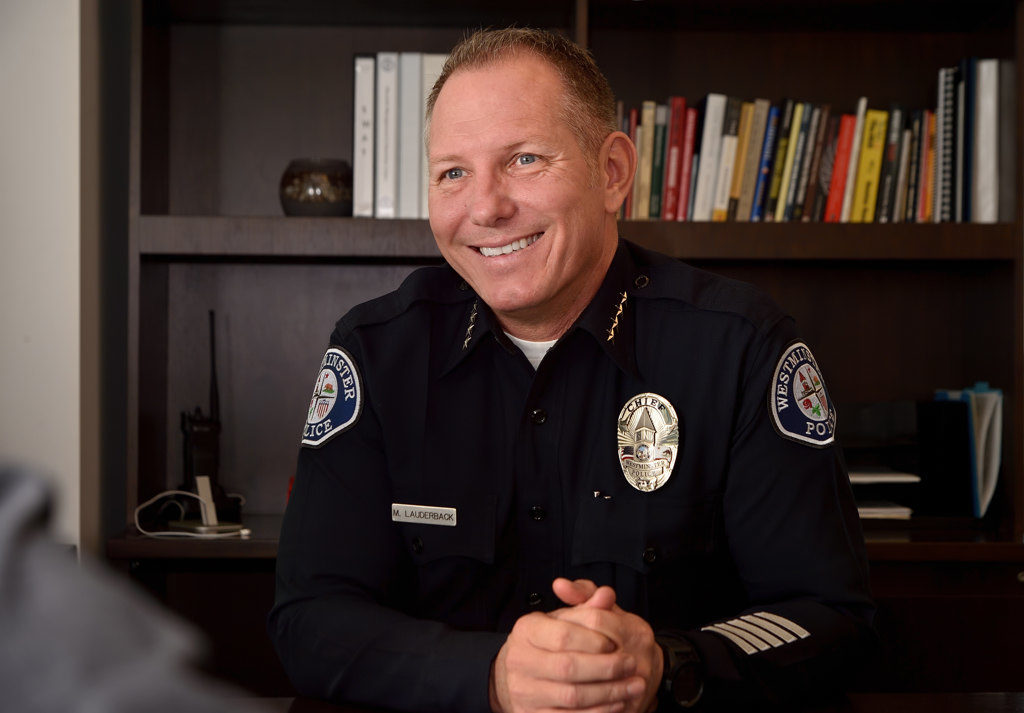
Westminster’s new Police Chief Mark Lauderback talks about his career and the road that lead to him becoming chief.
Photo by Steven Georges/Behind the Badge
BEANIES AND PINK STREAKS
In other efforts to improve the morale of his officers and members of the WPD’s professional staff, Lauderback has relaxed formerly rigid rules about dress codes.
For example, officers now can wear beanies during cold shifts. Beanies formerly were forbidden.
“You want to wear a beanie, wear a beanie,” Lauderback says. “What difference does it make? Is it going to affect the job you’re doing? No. It’s probably going to keep you healthy because you’re not going to get sick.
“It’s the little things like that people have been asking for that aren’t costing us anything, and it’s not changing the way we provide service to the community.”
Also, in November, Lauderback allowed female WPD employees to adds pink streaks to their hair, or paint their nails pink, in recognition of Breast Cancer Awareness Month.
“You want to know how many phone calls I’ve gotten because a girl had a pink streak in her hair?” Lauderback says. “Zero. Nobody cares.”
The chief also has extended the Movember facial-hair growing campaign, which raises money for prostate cancer research and awareness about the disease, through the entire month of December.
The WPD, Lauderback says, will begin testing for two vacant deputy chief positions in January 2020.
Outside of work, Lauderback loves to golf. He’s a mid-80s golfer. Two of his favorite area courses are Oak Creek in Irvine and Goose Creek Golf Course in the Inland Empire.
“I’ve always just been Mark,” he says of being chief. “Let’s come to work and have a good time.”
 Behind the Badge
Behind the Badge
